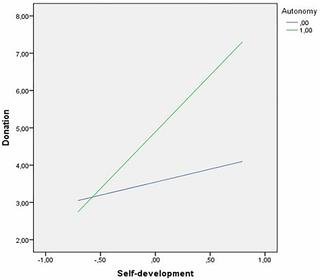PLOS ONE ( IF 2.9 ) Pub Date : 2019-03-15 , DOI: 10.1371/journal.pone.0213582 Luminița Pătraș 1 , Vicente Martínez-Tur 1 , Esther Gracia 1 , Carolina Moliner 1

|
Prosocial spending has been linked to positive benefits for individuals and societies. However, little is known about the precursors of prosocial spending directed to vulnerable people. We experimentally tested the effect of a first exposure to a prosocial donation decision on subsequent prosocial spending. We also examined the direct links from eudaimonic well-being beliefs (contribution-to-others and self-development) to prosocial spending, as well as the interaction between these beliefs and autonomy in predicting the money given. A total of 200 individuals participated in the study. Results showed that, compared to two control groups (“totally self-focused” and “no first-exposure”), an initial exposure to a prosocial donation decision increases subsequent prosocial spending. In addition, we observed an anchoring bias from the initial prosocial donation to subsequent prosocial spending. Regression analyses also confirmed the existence of a positive significant relationship between contribution-to-others beliefs and prosocial spending. Finally, we observed a significant interaction between autonomy and self-development well-being beliefs, such that autonomy strengthens the link from self-development beliefs to prosocial spending. In general, our results confirmed the significant role of exposure, anchoring, autonomy, and well-being beliefs in predicting the money spent to help vulnerable people.
中文翻译:

人们为什么要花钱帮助弱势群体?
亲社会支出与个人和社会的积极利益相关。然而,人们对针对弱势群体的亲社会支出的前兆知之甚少。我们通过实验测试了首次接触亲社会捐赠决定对后续亲社会支出的影响。我们还研究了幸福感信念(对他人的贡献和自我发展)与亲社会支出的直接联系,以及这些信念与预测所给予金钱的自主权之间的相互作用。共有 200 人参与了这项研究。结果显示,与两个对照组(“完全以自我为中心”和“没有首次接触”)相比,初次接触亲社会捐赠决定会增加随后的亲社会支出。此外,我们观察到从最初的亲社会捐赠到随后的亲社会支出存在锚定偏差。回归分析还证实了对他人的贡献信念与亲社会支出之间存在显着正相关关系。最后,我们观察到自主性和自我发展福祉信念之间存在显着的相互作用,因此自主性加强了自我发展信念与亲社会支出的联系。总的来说,我们的结果证实了暴露、锚定、自主和幸福信念在预测帮助弱势群体所需资金方面的重要作用。











































 京公网安备 11010802027423号
京公网安备 11010802027423号